How To Maintain A Proper Work-Life Balance?
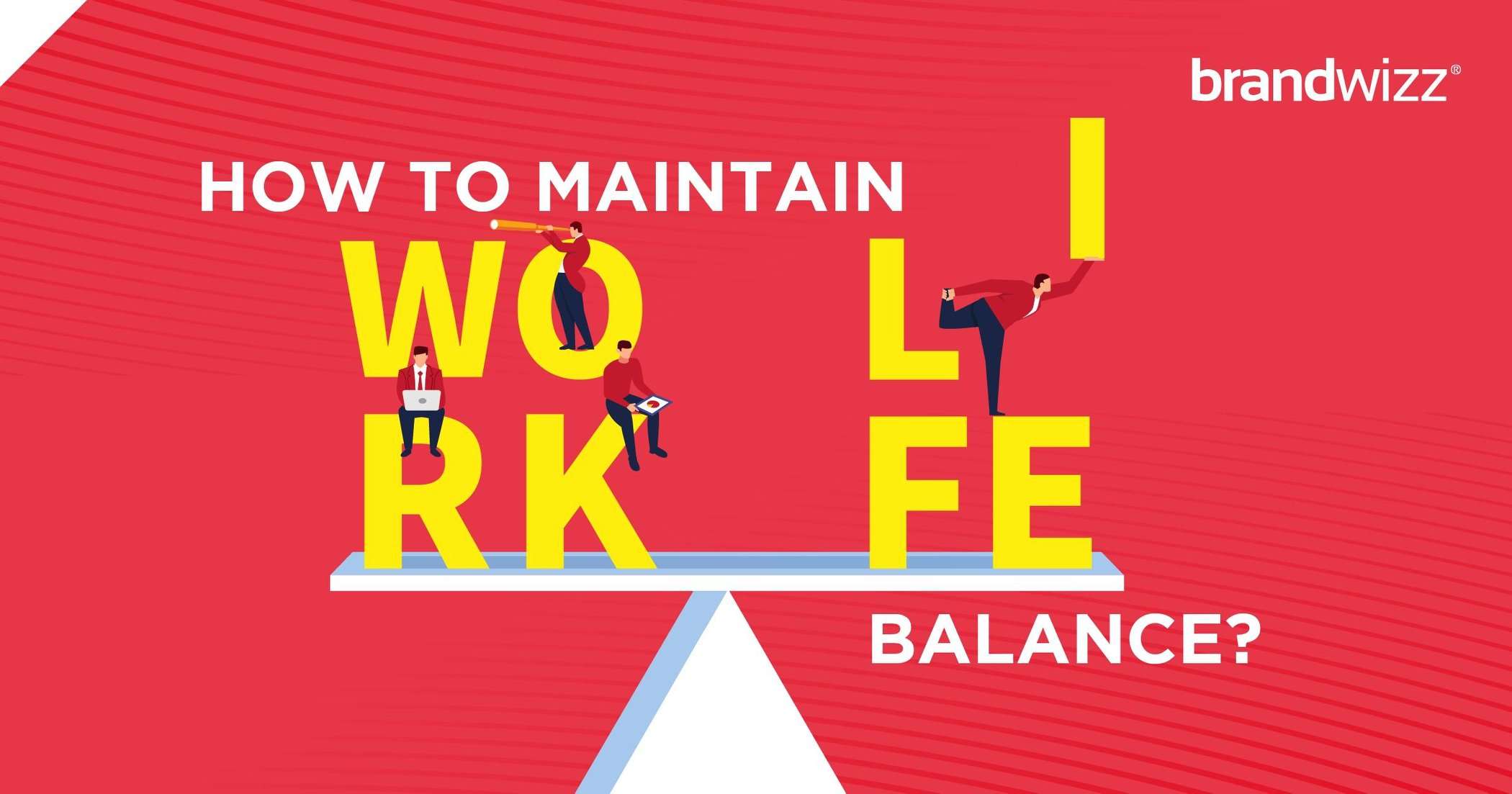
Thanks to the onset of the global pandemic, 2020 can very well be termed as a watershed year in terms of changes that came about in how each of us started managing our work-lives. A Microsoft Work Index Report revealed that India became the country with the longest ‘workdays’ (in terms of hours). However, longer working hours DO NOT translate into higher productivity (more often than not, the results are counterproductive) – while the work-life balance of employees often goes for a toss. For nearly 53% of India’s working population, having a proper work-life balance is equally important as their actual salary figures. The problem is, most people do not know how to attain (and maintain) this balance – leading to excess stress, burnouts, diminished productivity, and even job losses. In fact, 95% HR professionals in the US opine that workplace burnouts are one of the chief reasons behind the loss of good/promising team-members.
In a scenario where workloads are increasing everyday, it is absolutely critical to know how to maintain a proper work-life balance – to maintain high productivity levels at work, and enjoy their personal lives. Here are some handy pointers that will help you maintain that elusive work-life balance. It’s no rocket science, we promise!
Have A Dedicated Routine; Follow It Religiously
The secret behind efficient time-management is the ability to break down a day in different parts. Following a proper routine is crucial for this. Take out some time to prepare a daily schedule that works for you – and follow it as closely as you can (there can be the occasional day when there are other priorities). Make sure that you include all your professional deliverables, personal hours, and family time in your routine. Do not forget to add some breather either!
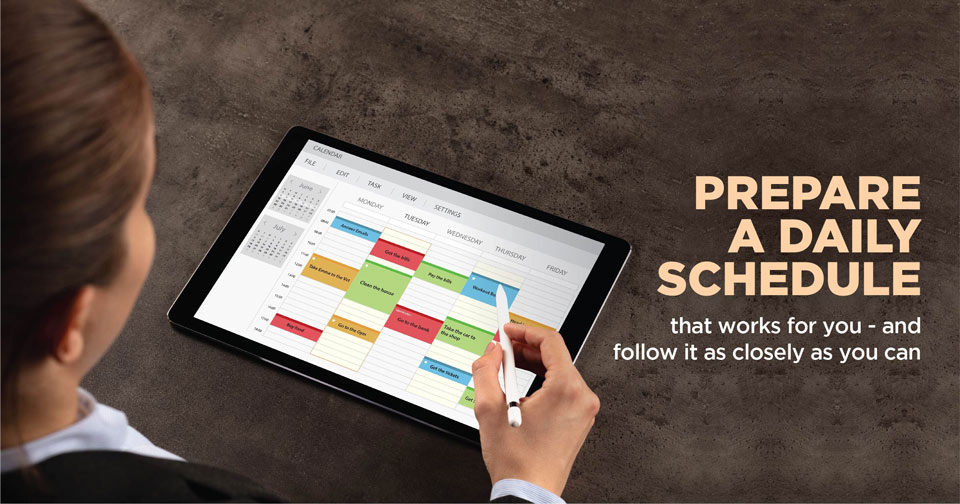
Prepare Proper Daily Schedule
Set Your Boundaries; Have Defined Work-Hours
Let’s clear up a myth first: staying LATE AT WORK everyday does not imply higher productivity levels (in fact, doing so increases burnout risks). Identify your most productive working-hours, and schedule the most important tasks during these times. Avoid activities that lead to time-wastage (checking social media feeds every few minutes, frequent visits to the coffee machine, etc.). This will help you wrap up your daily work within a stipulated time – and you can stop working beyond that. Keep your team-members & reporting authorities in the loop about the hours/days you won’t be available. Working late at night everyday, answering work emails at odd hours are not smart options.
Must Read- How Real Estate Developers Generating 25% Of Their Leads Through Digital
HARD WORK Is Overrated; Focus On SMART WORK
We live in times when a person’s productivity is often judged by how consistently (s)he performs at work. To be on the good books of those up top, you might also try and pretend to work equally efficiently right through the day. That, however, would be a folly – and what really makes a difference (and helps in maintaining a proper work-life balance) is the ability to work ‘smart’. Don’t be part of the bandwagon and follow set patterns. Your concentration, creativity, productivity are your own things – the onus is on you to understand how you can perform at your efficient best (and not be just a robot at work).
Say #ThankGodItsMonday like you mean it; not just to impress your bosses.
Perfectionism Works Great In Theory; Not So Much In Real Life
From our childhoods, the importance of being ‘perfect’ at everything – being the very best at what we do – is forcefully imbibed into us. However, as you start working professionally, you need to understand that being a ‘perfect’ individual – personally and professionally – is, more often than not, almost impossible. In fact, trying to be perfect all the time at work (or in your personal space) will invariably cause negligence in the other sphere. Be practical, be realistic, understand that – at times, being ‘good enough’ works great. Let go of the perfectionism bug, and your job-satisfaction will increase, your health & mood will improve, and you’ll get adequate time to spend with your loved ones.
Detachment and The Art Of Saying ‘No’
Think about this: how many times have you accepted unscheduled/additional tasks because you truly love the work? It’s more likely that you take up such extra burdens because you feel guilty about saying ‘no’. Irrespective of whether you are working at the office or from home, do not bite off more than what you can chew, from a personal or a professional perspective. Delegate tasks that you can’t fit into your already-packed schedule or do not enjoy doing. When you are done for the day, detach yourself from work, go for a walk, and do what you love to do. Unless you set limits, you will soon find yourself ‘overscheduled’.
Seek advice from your manager regarding how & when you can detach yourself from work.
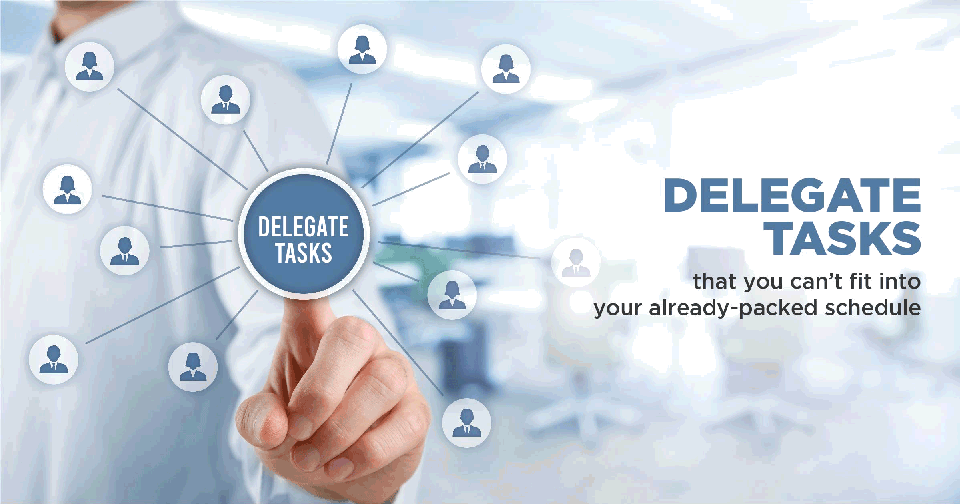
Delegate Tasks
It’s Okay To Take Breaks; Just Don’t Over-Indulge In Them
Among many people, there is a notion that unless they are seen at their workstations ALL THE TIME, the management will not view them in a favourable light. The truth is, however, quite the opposite. Take a stroll between tasks, crack a joke with your co-workers, do some free-hand exercises, before moving on to the next deliverable (make sure others are not getting disturbed, however). Human beings are not machines – and whatever others might say – you CAN NOT work for ten hours at a stretch. Take short breaks, get rid of work-fatigue, and maintain your work-agility.
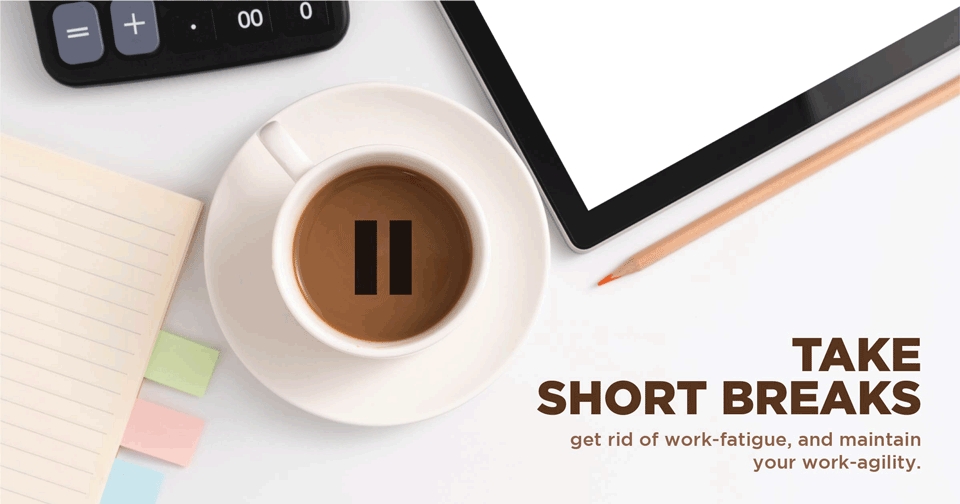
Take Short Break
Care For Yourself; If You Don’t, Who Will?
Life’s busy – there’s no two ways about it. There are family commitments and mounting work at the office. However, even in such a scenario, you need to ensure that you are getting adequate sleep everyday, following a healthy & balanced diet, and leading an active lifestyle. If you have some hobbies, take out time to nurture them (you’ll enjoy that sense of fulfillment, and burnout risks will go down). In the post-pandemic world, the popularity of flexible workplaces/working hours and the hybrid model of working is growing. These are helping in maintaining the balance between personal and professional commitments in a big way.
You Love Your Work; You Are Not Married To It, However.
Remember what we highlighted earlier about knowing when to stop working and shut up shop for the day? The same discipline should be followed when you wake up in the mornings. Do not start your day with work-related activities (replying to work emails, sending social media messages, etc.). Spend time with your family, do some meditation/yoga/exercise, get a nice shower, have your breakfast, and then start for work. Remember, you can work efficiently ONLY WHEN you feel ready for it!
Compartmentalise Your Work; Look Forward To Vacations
At times, certain work seems too BIG or problematic (e.g., preparing a 100-page white paper). Instead of trying to complete such tasks at one go – and sacrificing your personal space in the process – try to divide & compartmentalise the work into smaller, achievable goals (prepare 12-15 pages of the report everyday, and the task will be completed before you know it). In addition, take scheduled vacations to rejuvenate yourself – so that you can return as a fresher, better version of yourself. Many organisations encourage their employees to go for paid vacations a couple of times in a year.
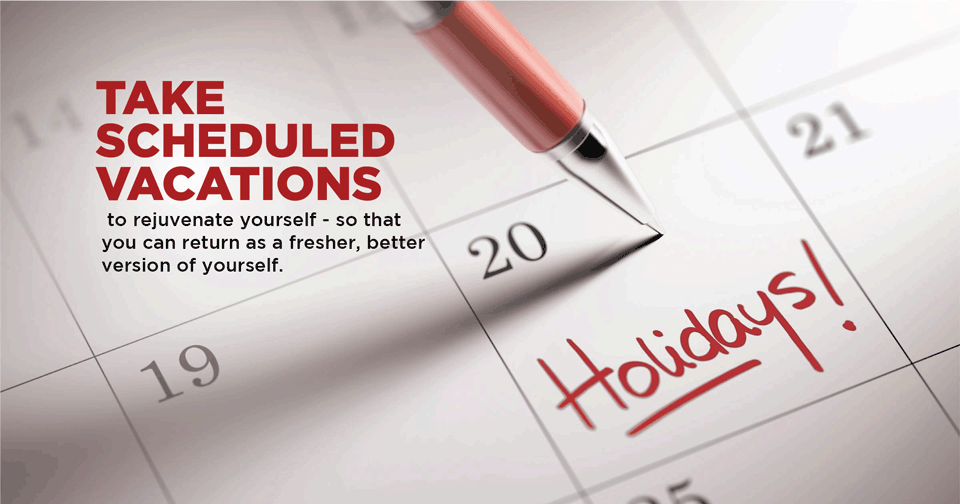
Schedule Your Holiday Vacations
Don’t Shy Away From Seeking Professional Help
The year is 2022, and it is no longer a taboo to speak out about mental health (from Ryan Reynolds to Kendall Jenner, and from Glenn Maxwell to Virat Kohli have spoken about the importance of mental health). In case you are feeling ‘broken’ and too stressed – make it a point to take time off and seek help from professionals (counselling sessions, therapies, etc.).Be more involved in your social life, surround yourself with your loved ones, and get back to work when you feel up for the task. Continuing to slog even when your brain is ‘fried’ is detrimental for yourself and everyone else.
According to a recent report, as weekly working hours go beyond 55+, risks of anxiety attacks, depression, fatigue and irritability start going up. For most people, maintaining a proper work-life balance is nothing short of a pipe dream. This is precisely where the importance of following the guidelines we have highlighted here comes into focus. Your professional and personal lives should never encroach on each other’s space – and the onus is on you to make sure of that.
Not everyone realises this, but by ‘working’ less, you can actually ‘do’ more!

Vandana is a Human Resources Manager at Brandwizz. She Heads Talent Management at Brandwizz. Apart from work, she loves reading and listening to music.



